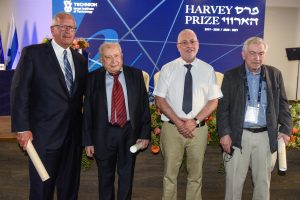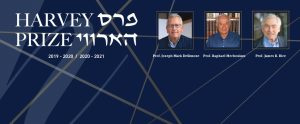Harvey Prize Ceremony
Three researchers received the Technion's prestigious Harvey Prize, which is considered a Nobel Prize predictor
On June 12, the prestigious Harvey Prize was awarded to Prof. Joseph Mark DeSimone from Stanford University (Science and Technology), Prof. Raphael Mechoulam from the Hebrew University of Jerusalem (Human Health) and to Prof. James R. Rice from Harvard University (Science and Technology).
In a moving ceremony hosted by Professor Asya Rolls of the Rappaport Faculty of Medicine, the three distinguished professors received their honors:
Prof. Joseph Mark DeSimone from the Departments of Radiology and Chemical Engineering at Stanford University received the 2019-2020 award in acknowledgement of his groundbreaking work on processes to cleanly synthesize fluoropolymers, fabricate precisely defined shape-specific nanoparticles, and enable the manufacture of 3D printed objects with unprecedented speed. For these and other contributions to materials science, chemistry, nanomedicine, and 3D printing and with gratitude for his resolute commitment to translating leading-edge science into impactful solutions promoting human health and welfare.
Prof. DeSimone thanked the Technion for the great honor and said that the interaction the Technion was nurturing between academia and industry is an important reflection of Leo Harvey’s legacy. “We must think carefully about these ties, as not every study will receive government funding. And sometimes the solutions to these challenges are found through the support of startups and industry.”
Prof. Raphael Mechoulam from the School of Pharmacy in the Faculty of Medicine at the Hebrew University of Jerusalem received the 2019-2020 award for pioneering research into the cannabinoid system and its effects on human health, for his many discoveries that have deepened our understanding of drug abuse and provided the promise of therapy for a wide range of diseases and pathological conditions, and with gratitude for his noble contributions to humanity.
Prof. Mechoulam thanked the President of the Technion and the Harvey Prize selection committee saying, “In the end, the prize is a tribute to my research group. Our findings, concerning the effect of cannabis molecules on the peripheral and central nervous system, have led to studies all over the world, which I believe will lead to the development of treatments for a wide range of diseases.”
Prof. James R. Rice from the Harvard School of Engineering and Applied Sciences received the 2020-2021 award for his enduring fundamental contributions to the mechanics of materials and to geophysics, for the development of the J-integral to calculate the energy release rate as a material undergoes fracture, and for his leadership that has expanded human knowledge about friction and earthquakes.
Prof. Rice said that most of his success over the years had to do with his mentors. “Mentoring really matters and is a large part of our responsibility as research academics and scientists. I am very grateful to the Technion researchers who have collaborated with me over the years.”
Technion President Prof. Uri Sivan gave an opening address in which he said it was his honor and pleasure to bestow the awards on the three esteemed prize winners. He thanked them for posing and answering excellent questions – and said that learning to ask good questions was the key to excellence in science. Prof. Sivan told them that they joined in the great Harvey Prize tradition of rewarding excellence for the betterment of humanity, adding that he looked forward to following their careers and wished them a lifetime of satisfaction.
Steve Berger, National President of the American Technion Society responded by saying it was truly an honor and privilege to bestow the Harvey Prize, and that the important commonality among all the recipients was their commitment to finding solutions to the problems of the 21st century.
The Harvey Prize awarded by the Technion was first given in 1972 through the foundation established by Leo M. Harvey (1887-1973) from Los Angeles, to recognize significant contributions in the advancement of humankind in the areas of science and technology, human health, and peace in the Middle East. The prize has become a predictor of the Nobel Prize, and more than 30% of Harvey laureates since 1986 were ultimately awarded the Nobel.
This prestigious prize has been awarded to scientists from the United States, Britain, Russia, Sweden, France, and Israel. Among them Nobel Laureate Mikhail Gorbachev, former leader of the USSR, was awarded the Harvey Prize in appreciation of his seminal initiatives and policies to lessen regional tensions; Nobel Laureate in Medicine, Professor Bert Sakmann; Nobel Laureate in Physics, Professor Pierre-Gilles de Gennes; Professor Edward Teller for his discoveries in solid state physics, atomic and nuclear energy; and Professor William J. Kolff for his invention of the artificial kidney.




